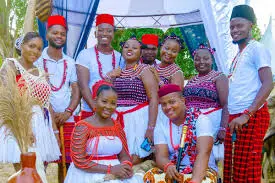“Cultural Threads:The meaning behind mijikenda clothing “
One of the most striking aspects of Mijikenda heritage is their traditional attire, which is not just about fashion—it tells stories, conveys status, and carries spiritual significance. Mijikenda dressing reflects their deep connection to their ancestors, environment, and way of life. Traditional Attire for Men and Its Meaning Mijikenda men traditionally wear a shuka, a…
Read morePOSTED BY
Jessica Rehema
The unique art of mijikenda
Vigango The Unique Art of the Mijikenda People The Mijikenda are a group of nine communities living along the southeastern coast of Kenya. These communities are the Kauma, Chonyi, Jibana, Giriama, Kamabe, Ribe, Rabai, Duruma, and Digo. Each group has its own customs, but they share many traditions, especially in art. Mijikenda art is deeply…
Read morePOSTED BY
Jessica Rehema
Celebrating Heritage: Kishutu Day in Kilifi County
The Maendeleo ya Wanawake Organization’s Kilifi County Chapter is organizing an exciting cultural celebration called Kishutu Day, scheduled for November 28th, 2024, at Chumani Primary School. This vibrant event aims to honor and preserve the rich cultural heritage of the Mijikenda community. Kishutu, a traditional attire worn by Mijikenda women, holds deep cultural significance. This…
Read morePOSTED BY
Erick Saddam
History of The Giriama people
History of The Giriama people Giriama are part of Mijikenda people whose oral history relates that the ancestors of the Mijikenda, who were then one people, lived in a place called Singwaya, believed to be north of Tana River and south ofJuba River in Somalia. However due to conflicts with other communities there they…
Read morePOSTED BY
Erick Saddam
Giriama Traditional Wedding
Kuhaswa – Traditional Giriama wedding The parents of the bridegroom look for the bride. They go to the bride’s home and the bridegroom’s father introduces himself and then says ”Fudzire mala Mudzungu wa utsunguni”. We have come to look for the cucumber, which is painful. The father of the bride answers ”nauhambale” let the painful…
Read morePOSTED BY
 Colors
Colors  Privacy Policy
Privacy Policy  Support
Support 











